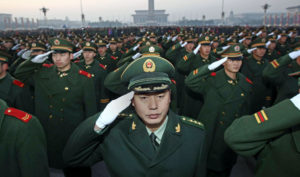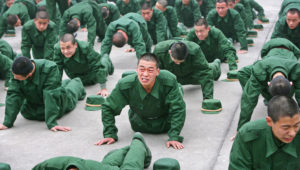By all accounts, the visit by the delegation of leading Chinese businessmen was a resounding success. Hidden away in sleepy Shropshire, Grainger and Worrall is a world-leader in the precision casting business. It prides itself on turning molten metal into complex components used in wind turbines, racing car engines, and speedboats.
But not all its products are so benign. The firm also makes key parts for military drones, vehicles, and artillery; its website is illustrated with photos of RAF helicopters, Royal Navy destroyers and Army tanks. And it’s with these products in mind that the team from the China North Industries Corporation, a Chinese manufacturing giant usually known as Norinco, paid a visit in 2015.
The Norinco team, led by Wang Yulin, president of its Development Academy of Machinery and Equipment, and Xiaoqing Cheng, the general legal adviser to its Vehicle Research Unit, were evidently impressed. “They are a large industrial company with 300,000 employees that covers planes, trains and automobiles,” Charlie Bamber, G&W’s business development manager for Asia, later told the Shropshire Star. “There’s no limit to the opportunity.”
Among the possibilities was a “joint venture” — the building of a “mass production entity” that would use G&W’s technology in China. Such a factory, Bamber continued, “can’t be in Shropshire, but parts leading up to it can. It’s clearly an opportunity for the county”.
Yet a crucial detail was left out from his statement. Namely, that the Chinese characters that make up Norinco’s name in Mandarin — 中国兵器工业集团公司 — do not mean “China North Industries Corporation” in English, as the firm implies. What they really stand for is: “China Arms Industry Group Co. Ltd”.
Even so, G&W could not plead ignorance. It is well-reported that Norinco, owned by the Chinese state, is the biggest weapons manufacturer in China, producing tanks, grenade launchers, shells, rotary cannons, drones, missiles and strike aircraft. In 2003, George W. Bush sanctioned the company for selling ballistic missile technology to Iran. It has since been blacklisted in America because of its close relationship with the People’s Liberation Army, following executive orders issued by Donald Trump and Joe Biden.
One might think, then, that G&W would have something to say about its partner’s dubious reputation. Yet when I enquired about its Chinese business, which has grown significantly since 2015, it refused to answer any of my questions, beyond issuing a blanket statement insisting that it had done nothing wrong and always obtained UK government approval. On a brief phone call, Bamber suggested I was xenophobic for even questioning its relationship with Norinco. “I think you’re probably aligning yourself with many people who are extremely racist,” he said. “You’re fabricating a scenario which doesn’t actually exist.”
In all fairness, G&W’s dealings with Norinco began in the so-called “Golden Age” of Anglo-Chinese relations under David Cameron and George Osborne, when far from being seen as a possible threat, China was promoted by the British government as a rich and generous benefactor.
Since then, however, the political atmosphere has soured dramatically. Hong Kong’s freedoms have been crushed, the Uyghurs have been subject to genocide and China has threatened to invade Taiwan. Fears over China’s acquisition of advanced Western technology have reached an all-time high, as MI5’s Director General Ken McCallum and FBI Director Chris Wray warned in their joint address in London last month. During their press conference, McCullum pointed out that China doesn’t even need to resort to “clandestine espionage methodology” to get its hands on the West’s technological secrets. British businesses and academic institutions are giving IP away in plain sight, under the guise of seemingly innocent commercial deals or academic partnerships.
In recent months, Britain’s politicians have also woken up to such dangers. The National Security Bill — currently going through parliament — would grant further powers to the British government to “combat state threats not just to national secrets but to your intellectual property, your commercial edge, your unique research”. Yet the proposed new law will not be retrospective: intellectual property that has already been shared cannot be taken back. This means the near-decade that G&W has spent working with Norinco is unlikely to come under scrutiny.
It is hard to say precisely when G&W first became involved with China, given its reluctance to talk about it. But it appears to have taken place in 2013, when a company called FLUID Transmission Technology became G&W’s Chinese agent, tasked with looking for business that might benefit from its intellectual property. FLUID doesn’t even try to hide its connection with the Chinese military. Its goal is to promote “military-civil fusion” (MCF), which the US State Department describes as an “aggressive, national strategy of the CCP” to help China develop “the most technologically advanced military in the world”, partly by “acquiring and diverting” cutting-edge technology from around the globe.
The most sinister aspect of this MCF strategy is that China is seeking to “exploit the inherent ‘dual-use’ nature” of many civilian technologies that can also be used for defence purposes. In other words, it aims to use seemingly harmless Western technology to strengthen China’s military.
In 2018, FLUID met with the Communist Party leadership of the heavily industrial Minhang district of Shanghai, known to be dedicated to MCF. It was the start of a blossoming relationship. Later that year, Matthew and Edward Grainger, the brothers who run G&W, visited Norinco’s Beijing headquarters along with FLUID’s chief executive, Liu Guosheng.
The visit was a triumph for everyone involved. It paved the way for Factory 616 — a casting plant in the city of Datong — built using G&W’s technology by a firm called Shanxi Diesel, a subsidiary of Norinco. The plant is making parts for high-speed water-cooled diesel engines, which could be used in civilian or military vehicles. As G&W has itself pointed out, such technology is a perfect example of dual use.
G&W seemed determined to conquer the Chinese market. It went on to set up a version of its website in Mandarin. In 2020, however, the site abruptly disappeared — when the Huawei scandal hit Britain. It advertised one of G&W’s most innovative and desirable products: a cast made of Compact Graphite Iron, which set “new standards in terms of weight, size, reliability and most importantly, fuel consumption”. This too could have military applications for vehicles and aviation.
Then, in November 2019, G&W’s top leadership visited Minghzi Technology, a casting manufacturer in Suzhou. There they signed an agreement, which Minghzi said was “the start of a comprehensive collaboration” — the goal being “to expand business in China and Europe… by tapping the unique strengths of each company”.
When I approached the firm, all it would do was issue a statement insisting everything was above-board: “Each G&W customer opportunity is reviewed for business and commercial fit, moral and ethical soundness, and against UK Government controls. All recommendations and decisions made by the ECJU and DIT are strictly complied with by G&W. In no circumstance is business undertaken in controlled geographic regions or market sectors without the full knowledge and approvals of UK Government. G&W regularly undertake strategic reviews of international operations, taking into account legal, moral, ethical, and geo-political situations.”
Despite their apparent confidence in the deal’s propriety, Matthew and Edward Grainger have refused to be interviewed. Bamber, too, avoided me after our first phone call. After accusing me of racism on the phone, he promised to answer my further questions via email, but never replied.
At some point, though, G&W may have to explain itself. Charlie Parton, a former Foreign Office China veteran and now a Royal United Services Institute fellow, said: “There needs to be a full investigation into what this firm is actually doing… It’s basic: you don’t help a political enemy acquire technology that might be used against you. If that’s what G&W has done, we need to know.”
And we need to know sooner rather than later. As its recent exercises just off the coast of Taiwan demonstrated, Beijing has no qualms with showing off its new weapons. For now, it is preoccupied with its battles in the East. Should its focus shift Westwards, Grainger and Worrall — not to say the UK government — may just find they’ve shot themselves in the foot.
Disclaimer
Some of the posts we share are controversial and we do not necessarily agree with them in the whole extend. Sometimes we agree with the content or part of it but we do not agree with the narration or language. Nevertheless we find them somehow interesting, valuable and/or informative or we share them, because we strongly believe in freedom of speech, free press and journalism. We strongly encourage you to have a critical approach to all the content, do your own research and analysis to build your own opinion.
We would be glad to have your feedback.
Source: UnHerd Read the original article here: https://unherd.com/




